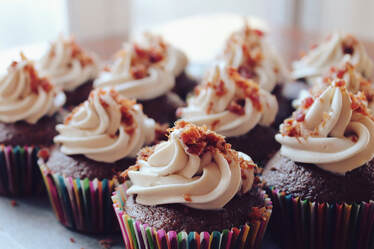 With just a few days before Christmas I thought I'd put off finishing my Christmas shopping just a little longer a write a few thoughts about this time of year. Everyone celebrates Christmas differently so these are just some of my opinions and thoughts on what I'll be thinking and doing during the day. To set the scene a little our family will celebrate by spending most of the day together opening presents in the morning and then a few different courses of food spread over the day. How I'll Decide What I'll Eat It's quite a simple formula really. If I think I am going to enjoy eating something, I'll eat it. This is a day I will not be thinking about the healthy eating guidelines, a plate model or anything like that. I'll trust my gut and if I think consuming this is going to be pleasant, then down the hatch it'll go. Now I will still be mindful of what I am eating. As I said, if I think I am going to enjoy eating it I will; I will not be going on, nor do I recommend going on an uncontrolled binge. That will likely end with me feeling uncomfortably full, potentially a little sick, and most importantly without any room for dessert. I'm not missing my sisters Tiramisu! I think eating this way means I get to enjoy the foods I really love and helps me to enjoy the day by not feeling sick at the end of it. What I'll Be Thinking Christmas can be a stressful time. What I'll be thinking about to try to manage the stress is "not to let the little stuff ruin my day", particularly the stuff to do with food. Whether you're doing the big family get together or more of a low key celebration there might be a few little things throughout the day that don't go your way. The Christmas ham may not be how you like it, you might burn the chicken, forget to make such and such's favourite salad or someone might not like a gift you got them. In my mind anyway all of these things are really, when you think about it, very insignificant. At the time they may seem like the end of the world but in the scheme of things they don't really matter. Take a step back, smile and enjoy the day. I know there is going to come a time in my life when the consequences of a negative event are much more important than burning the Christmas cannelloni, so I should make the most of this day. Over the years I've been made more aware of how lucky I am to spend this time with my family and have access to more than enough food. I now know Christmas can actually be a hard, lonely and overwhelming time for some and so I think it's important that I spend some time sparing a thought for others, and asking myself how can I make someones else's Christmas better? There are some awesome initiatives in place working to share the Christmas love both locally in New Zealand and internationally. Plunket for example does a tremendous job gathering food and other gifts for families struggling over Christmas time, delivering them in boxes in the lead up to Christmas. Making someone else's Christmas better in my mind could be as simple as looking out for someone locally in your community who might not expect a kind message, a present or even a little bit of your time. Have a wonderful Christmas and a happy New Year team! Thanks for reading. Marco
0 Comments
 This is the final part of the three-part series of lessons learned in my first year as a student dietitian. Click here for parts one and two. The Amount of Misinformation Being Spread Many years ago, as a teen trying to work out what the heck I was meant to be eating I was quick to trust the advice of people who I thought were trustworthy when it came to nutrition. I assumed being an author or because they had the letters “Dr” in front of their name their views on nutrition must be right and one I should hold in high regards. Nowadays some of the biggest frustrations for me are reading things presented as absolute truth but in reality, there is not a shred of evidence behind them (not evidenced based, remember the restaurant analogy) or even worse, we have great evidence they are completely wrong. Funnily enough, those saying these things are normally talking outside of their scope of practice (remember that means talking about stuff you don’t actually know about) and have just read something on someone’s blog, heard something on someone’s podcast or they’re being paid to endorse something. Now as I have mentioned previously, I have a particular scope of practice and so I don’t claim to know everything, but after being engrossed in the field of nutrition for four years I have picked up more than enough to see that many of those people who I perceived as being knowledgeable to actually just be sharing, for lack of a better word, bullshit. My best advice to you is, be skeptical of the nutrition information you read and hear from public figures. Ask the question, why should I listen to this person? Are they an expert in what they are talking about? While there are some good places to go for nutrition information on the internet or in books, a registered health professional like a dietitian or registered nutritionist is generally the safest place to go. The moral of the story for me this year though is listen to the experts in their respective fields, not the businessman dressed as an "everything related to health expert" or the wannabe “Jack of all trades” because they are the experts of none. The More You Learn, The Less You Realize You Know This was something that stuck with me after my first day as a student dietitian. The more you start to unravel a problem the more you understand just how complex it really is. With nutrition, it seems the more I learn, the more I see there is to learn. It can certainly feel like you’re trying to climb a mountain on a treadmill at times but at the same time is very exciting that there is always something new to discover. It reminds me of the importance of staying up to date and so makes me glad that I chose to do something that I have a genuine passion for, because I have my work cut out for me climbing that mountain. While I think a trait of a true expert in their field is possessing the ability to simplify a complex topic, be skeptical of those who oversimplify things, because that may be a sign they themselves do not understand how complex that thing is. One common oversimplification is that sugar is bad. If you start sharing the message that sugar is bad people become confused or think they should stop eating everything with sugar in it, like fruits and dairy/dairy alternatives. In reality, these foods make up part of a healthy diet. You’re also more likely to make people feel guilty when they eat something with sugar in it. Now don’t get me wrong, products with large amounts of added sugar are not health promoting, but part of living a healthy, balanced and enjoyable life is enjoying a piece of your favourite dessert on occasion. Making people feel guilty about it ruins those times when they have cake. Cake tastes good. Please don’t ruin cake. The main lesson here for me, don’t ever assume you know everything there is to know about anything. Chances are further you keep digging the more you’ll realise you have to learn. In Summary With my first year as a student dietitian over I’ve had some time to re-evaluate what I’m trying to achieve with my blog. After much thinking not a lot has changed. My mission is still to educate the world about how what they put into their body’s effects them and make positive changes in the health of others. I will continue to provide education and answer questions within my scope. While I am certainly no chef, I will also continue to share relevant meal ideas and recipes trying to provide options that are a combination of health promoting, quick, easy and cost-effective. I hope I have managed to get across the significance of the past year for me. I think it's important I also show some appreciation to the dietetics teaching team at Otago uni as well as my amazing classmates who have been the source of much of my learning. The sophistication of the brains and character of the people that make up both the teaching team and my class can't be well described in words (well a few short ones anyway). Look out for some waves to be made in the nutrition world in the coming years. Thanks for reading. Marco  Picking up where I left off yesterday with more lessons I have learned in my first year as a student dietitian. If you have haven’t read part one you can find it here. Our Relationship with Food How we think about food and our relationship with it perhaps does not get talked about enough. It wasn’t until this year I noticed how different our relationships with food can be. From using it as comfort, stressing and worrying about it, seeing certain foods as the enemy, understanding it can fuel performance, different people see food differently and so one major lesson for me is to be more mindful of how I talk about it. The impact that an individual with a respected opinion can have on another person’s thinking, by what they say, is much larger than I thought. Therefore for me to make sure I am working to reduce the wave of negative relationships and disordered eating I need to be mindful of how I talk about food. I have the belief that food should not be the enemy, a tax, a chore, or something we are working against. Food is nourishment, enjoyment, healing, and growth; it is a positive part of our life but for some, this is not the case. It is my opinion that one contributor is the way we talk about food and the culture this has created. So often as soon as I mention the words nutrition, healthy eating and food people directly associate that with
The mental aspect of food is one field of nutrition I have a lot to learn in and so I look forward to sharing that with you all over time. Evidenced-Based Practice You know when you get asked for a suggestion? Like what should someone get when they go to your favourite restaurant for example, and you get a teeny bit nervous after telling them because they might not like what you recommended. Well previously one of the biggest worries for me when providing any sort of nutrition advice was giving advice that was not beneficial or worse yet, did more harm than good. While reading and understanding research was part of my first degree it wasn’t until this year that I got to see what evidenced-based practice looked like. The name mostly gives it away and it ties into what a dietitian does. It is making decisions based on what research is available in conjunction with your professional expertise. As a healthcare professional, with a direct impact on people's health, it is crucial that the advice given is based on evidence. I know for me this provides confidence that what I say and do as an aspiring dietitian is not just sound but the best I can do, as well as minimising the risk of causing harm, putting some of my fears to rest. Going back to our restaurant analogy, not working through evidenced-based practice would be like recommending something that you hadn't tried, but sounded good when you read its description on the menu. You have no evidence that dish tastes good, you're just basing it off what you think it might taste like. There are many nutrition "theories" that sound like they should promote your health because they do this to your metabolism or that to your cells. However, like in the restaurant, sounding good and tasting good are different things, or in the case of nutrition, sounding health promoting and actually promoting health are also different things. In a restaurant if you make the wrong choice or the dish comes out different to what you expected, like when they don't tell you there's coriander in the dish and you really don't like coriander, you might leave dinner a little dissatisfied but no real harm is done. When dealing with health if you start recommending things that sound good as a theory, but when tested don't work out how you thought they would; or you realise you didn't consider or know (surprise coriander) that it would actually lead to these other harmful things, you have much higher stakes than leaving a restaurant dissatisfied. Research does take time and money to conduct so not everything has been thoroughly investigated. This is where clinical judgment comes into things along with looking at what evidence we do have and how that relates to the situation. That is a basic and very rudimentary explanation of evidenced-based practice, I will do a separate post on what research looks like down the track but the crux is basing your actions and recommendations off evidence to make sure it works and that it is safe. Tomorrow I will post my final lessons learned around the current pile of misinformation being spread and something that stuck with me from my first day. Thanks for reading. Marco  This past year has been huge for me, and at the core of it all was beginning my journey as a student dietitian. Over the past months I went a little quiet on my social media as I was finishing my first year of dietetic training. Once that was up I thought it would be a good idea to take some time to reflect on this year and some of the major lessons learned for me, as well as how I want to continue to shape Marco Mollo Nutrition. This post is part 1 of 3 of a summary of the most important things I have learned and thought about this year. What is a Dietitian? To be honest prior to starting my first year of training I only had a vague idea of what dietitian’s do. Which was interesting looking back on it because I was committing to two more years of study and a few more dollars added to my student loan. There are two points about a dietitian that I think are important to make first. One, that the title “Dietitian” is a protected name, you need to have completed a certain level of study (Masters degree) and be registered within New Zealand to call yourself a dietitian. The second point, contrary to what many people think, dietitians are not the food police who scrutinize and judge your food choices, like when you eat the fairy-bread at kid’s parties. Chances are you’ll probably see me eating some of the fairy-bread at kid’s parties. What a dietitian is trying to do is get a picture of what life is like for you, then from there work, with you, to make achievable changes to your eating habits to promote your health and well-being. As with many professions, dietitians must continually learn and stay up to date to remain registered, so a big part of what the dietitian does is interpret, analyze and appraise what scientific research we have, as well as the new stuff as it comes out and translate that into recommendations for the average Joe. In essence, they make sense of the science, so you can work with them to mould that into realistic behaviors for you to implement. What some people are not aware of is there is a range of different settings you might find a dietitian. Dietitians can consult people 1:1; they can be found on the wards in a hospital; they may work within a foodservice like a residential aged care facility or prison; dietitians work for public health organisations promoting healthy eating or creating educational resources and programmes for communities; they may also give advice on policy. These are just some of the roles a dietitian may have. While I now have a great idea as to what the dietitian does, I think my understanding of the dietitian's role will continue to develop throughout my career. Remaining Within Your Scope of Practice A prerequisite to starting a Masters in Dietetics is having a degree in nutrition. At the conclusion of my nutrition degree I felt this expectation to know everything about nutrition and be able to answer everyone’s questions. I think that is a common feeling we as people have when we’re seen as an expert in a particular field. In reality I didn’t always have an answer, and as I learned this year that is to be expected. From kidney disease, sports nutrition and paediatrics there are many branches within nutrition and for someone to be a true expert in all of them is extremely unrealistic. I have learned this year about where my expertise lies and the boundaries of my scope of practice/knowledge, so I can better serve the people I work with. As this knowledge grew it also became clearer to see where people were stepping outside of their scope of practice, particularly in the health and fitness industry which I will discuss in the last part of this series of posts on Friday. Part 2 will be out tomorrow morning talking about the lessons learned around the mental side of nutrition and evidenced based practice. Thanks for reading. Marco |
AuthorWrite something about yourself. No need to be fancy, just an overview. Archives
November 2020
Categories |
